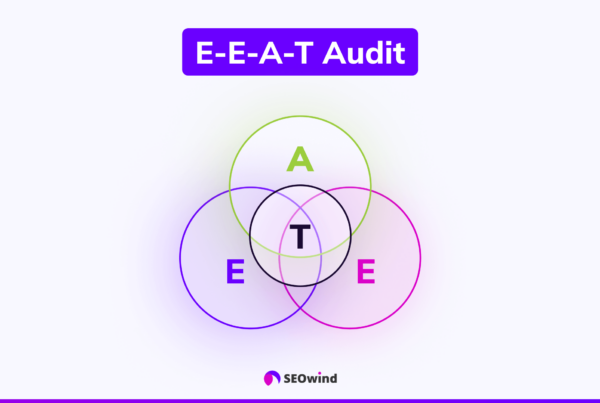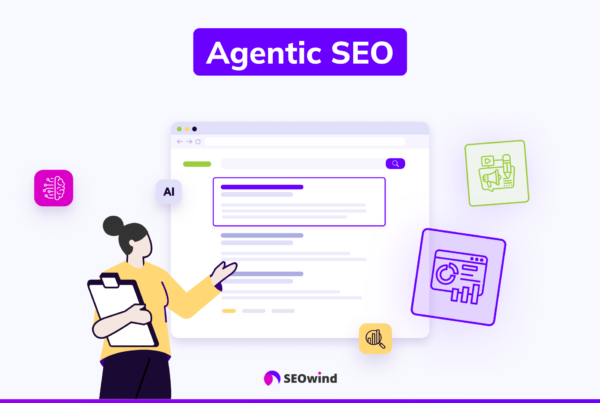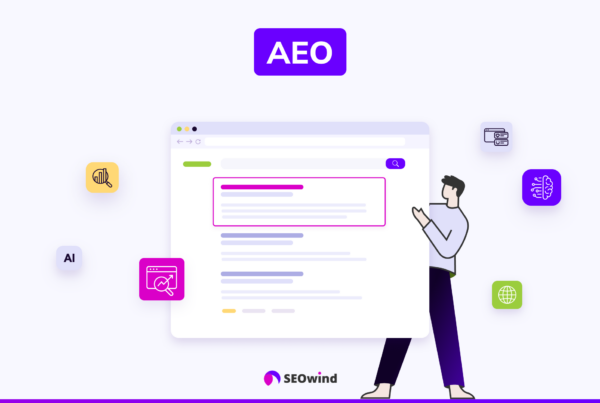Today, we stand at the cusp of a new age in which Artificial Intelligence (AI) transcends boundaries once thought impenetrable. This article takes you on an enlightening journey where creativity and technology converge: the world of AI-generated content. We will demystify this intriguing concept for you, carefully unpacking its implications across numerous industries while also pondering potential ethical difficulties that arise in its wake. Are you ready to glimpse the exciting future sculpted by AI?
What is AI-generated Content?
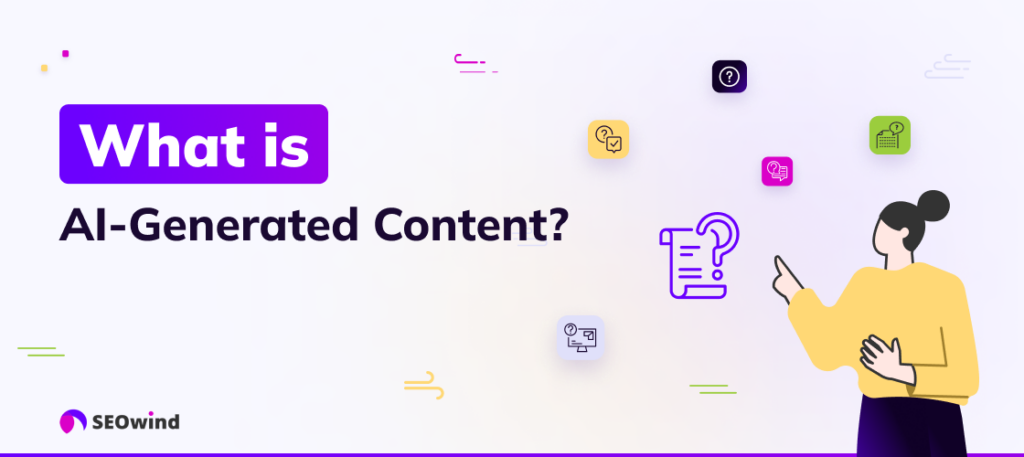
AI-generated content represents a fascinating intersection between cutting-edge technology and compelling narratives. It employs machine learning algorithms to autonomously generate text-based material that fits any given criteria or context. This includes informative articles, persuasive marketing copy, fascinating stories, or insightful product descriptions.
This innovative process fundamentally transforms how organizations create and distribute content, providing unparalleled efficiency and adaptability. Thanks to advancements in Artificial Intelligence capabilities in recent years, generating engaging content with AI has become feasible and increasingly prevalent across different sectors.
At its core, what is known as AI-generated content involves machines emulating human-like writing attributes without requiring direct manual input during content creation. The onset of Artificial Intelligence in content creation marks a significant evolution from traditional methods, wherein creating quality narratives was purely an effort-intensive human endeavor.
The Role of Artificial Intelligence in Content Creation
Let’s plunge into Artificial Intelligence and its transformative role in content creation. Imagine AI as a maestro conducting an orchestra that performs a comprehensive symphony of digital content. How does this occur?
Artificial Intelligence infuses cutting-edge technology with sophisticated algorithms to process human-like tasks, such as learning, decision-making, problem-solving, and, more fascinatingly, creating content.
Creating content with AI encompasses a vast spectrum of applications, from producing articles to writing product descriptions. It can generate personalized email marketing campaigns, compelling ad copy, or even spark creativity in storytelling or scriptwriting. Nothing remains aloof from the enhancing touch of Artificial Intelligence-generated content.
You may be wondering what factors enable AI to whip up quality prose akin to human talent? Well, it all boils down to Natural Language Processing (NLP) and Machine Learning (ML).
Natural Language Processing involves enabling machines to comprehend human language nuances. On the other hand, Machine Learning empowers computers to learn from past data sets and experiences without being explicitly programmed.
When used together, NLP and ML work their magic by analyzing large volumes of data quickly and effectively. This analysis enables insights about patterns that help tailor unique, informative articles or dynamic website copies faster than traditional human capabilities could allow.
That is how your friendly neighborhood Artificial Intelligence becomes a competent counterpart in content production.
However attractive this may sound, there’s something we must bear in mind. While Artificial Intelligence has indeed broken new ground in efficiency and cost savings for organizations worldwide, it is meant to supplement our efforts rather than replace humans.
After all, at the heart of every enthralling piece of literary artistry lies a distinctly human sentiment: empathy. This is a trait that, for now, is out of AI’s grasp. So, as we traverse the evolutionary path of content creation with AI, let’s remember to blend our remarkable human touch with this powerful technology harmoniously.
That way, we’ll harness the best features Artificial Intelligence offers while nurturing those elements of communication that make us inherently human. It is a symbiotic synergy that provides myriad potential to all content creators. Exciting times are ahead in the realm of AI-generated content!
Understanding Generative AI
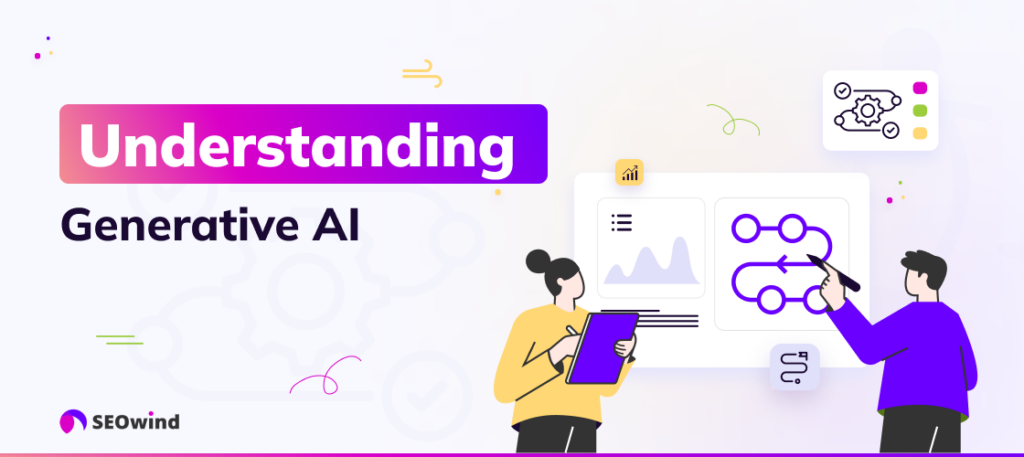
Generative Artificial Intelligence, often called generative AI, is a crucial piece of the puzzle when it comes to understanding what AI-generated content truly means. This section seeks to explain this concept more clearly and break down its relevance in generating AI-driven content.
Explaining the Concept of Generative AI
To appreciate what AI-generated content entails, we first need to review the mechanisms behind generative AI. These sophisticated algorithms can create something new from pre-existing patterns and data, similar to how an artist might learn to sketch by studying several portraits before attempting their own.
Unlike your traditional rule-based AI systems that strictly follow programmed instructions, generative models are dynamic. They teach themselves by observing millions of data instances and identifying underlying patterns. After intensive training, they produce outputs that mimic those found in their training records. While at work, you could liken them to intelligent apprentices who’ve watched a thousand pottering sessions and have only now started making pots on their wheels!
The keyword here is ‘learn.’ Essentially, this algorithm successfully emulates characteristic features from existing examples it has studied during training phases without yielding identical replicas.
How Generative AI Algorithms Work in Content Generation
Now, you may ask: “How exactly does this learning process translate into creating content?”
Significant strides in Natural Language Processing (NLP) have enabled machines to better understand human language by detecting subtleties such as different contexts or idiomatic expressions. The intricacies involved include:
- Tokenizing sentences into words or phrases.
- Studying relationships between tokens.
- Storing these observations for reference.
Using derived rules to generate text intelligently is akin to mastering grammar rules after reading myriad books.
Generative models undergo a two-step process when producing textual material like blogs or articles. Initially, they capture essential features from existing content by analyzing structure, tone, theme, and more. Then, generative models synthesize new material based on those patterns in a refined mimicry.
Consider this automatic writing as crafting sentences through an intelligent prediction game. Initiate with a word or phrase—say ‘What is?’—and let the model predict possible continuations of that sentence based on all the patterns it has observed previously. For example, it might offer a result like “What is AI-generated content?”
It’s important to note that while these predictive texts generated by AI can be impressively accurate and valuable, there are limitations, which we will explore at length later in this article.
As we embrace this technological renaissance where machines and man co-create intelligently, we see Artificial Intelligence in content creation influencing diverse industries such as journalism, marketing, and even literature!
The Benefits of AI-Generated Content
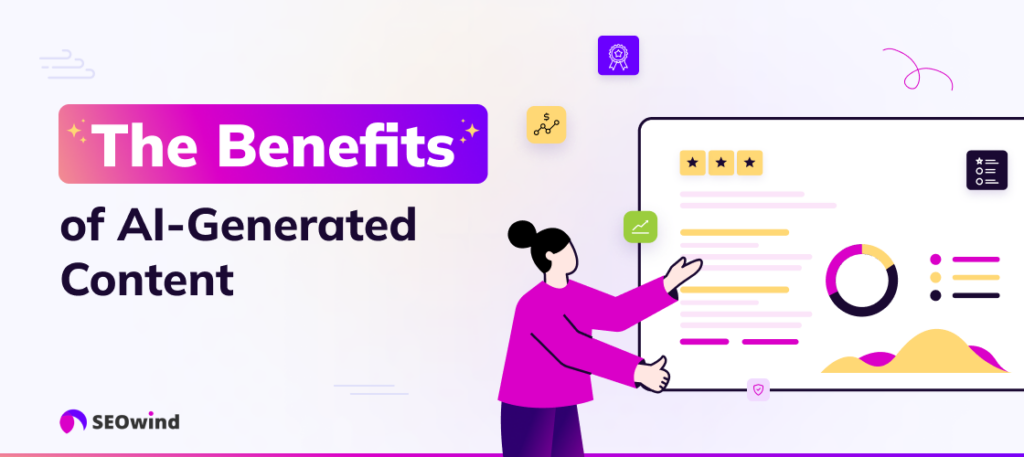
The advent of AI in content creation has ushered in some significant advantages that can revitalize how industries function. Let us delve deeper and examine these benefits, offering a fresh perspective on the purpose and use of Artificial Intelligence-generated content.
Faster and More Efficient Content Production
One notable benefit of employing AI is its ability to accelerate the content production process immensely. Unlike humans, who need breaks and are subject to work hours constraints, Artificial Intelligence in content creation doesn’t falter or fatigue. It has cemented itself as a reliable ally for those needing vast content created quickly.
Through automation, AI allows companies to produce time-sensitive articles such as news updates or stock market reports almost instantaneously. Moreover, it frees up precious time for human writers, allowing them to focus on strategic tasks where their expertise brings irreplaceable value.
Enhanced Creativity and Innovation
At first glance, you might assume that machines lack the creative spark characteristic of human writers. However, that isn’t entirely accurate! Indeed, generating ideas can be challenging, even for the most seasoned professionals. Creating content with AI proves its worth by introducing new angles and perspectives we may not have considered.
AI-powered tools can generate numerous variations around a central theme or idea, stimulating innovative approaches to familiar topics. Every concept an algorithm produces is unique, ensuring diversification while maintaining contextual relevance.
Cost-Effectiveness and Scalability
Integrating AI into your operations reduces costs drastically compared to hiring multiple full-time employees to manage large-scale projects. Artificial Intelligence does not require salaries or health benefits, making it cost-effective, especially when more significant outputs are necessary.
Moreover, scalability is another integral advantage of using AI systems for creating content. As your business grows and changes, so will your requirements for content volume and type, all without any significant increase in expenditure.
Personalization and Customization Opportunities
Lastly, AI-generated content offers marvelous personalization opportunities. Nowadays, customers appreciate personalized experiences that resonate with their needs or interests, from targeted marketing messages to custom-tailored product recommendations.
AI can analyze user data such as search preferences or past purchases to generate content matching individual tastes. It allows for more dynamic interactivity and caters to the customer’s journey more acutely to foster brand loyalty and higher conversion rates.
The benefits of AI writing tools transform how businesses traditionally approach content creation. As an evolving technology, who knows what surprises Artificial Intelligence will deliver next?
Potential Drawbacks and Concerns of AI-Generated Content
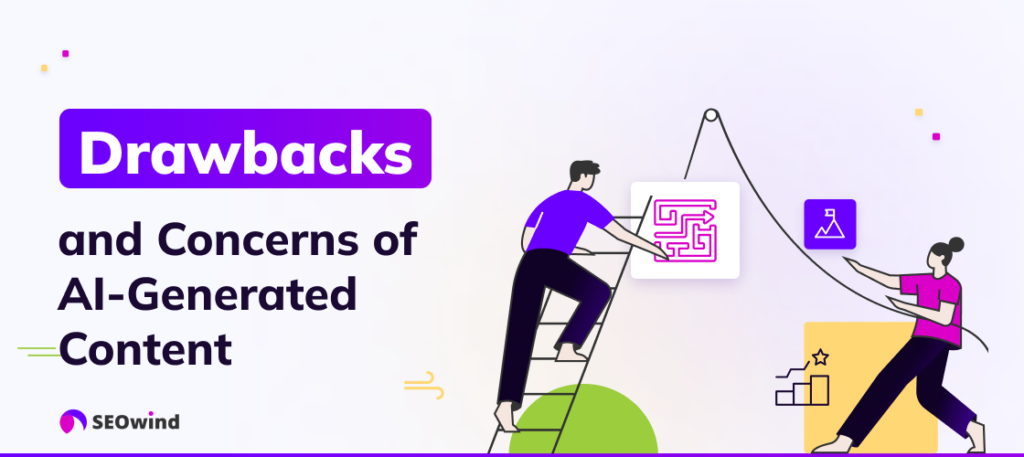
While harnessing Artificial Intelligence to automate content creation shows immense promise, there are essential obstacles and concerns that we need to navigate. Breakthroughs always come with unique challenges; it’s the same story for AI-generated content.
Lack of a Human Touch and Emotional Understanding
Robots have innate limitations regarding emotions and subjective understanding. Artificial Intelligence works systematically, following pre-installed algorithms without a smidgeon of emotionality or intuitive decision-making, a fundamental quality of human writers.
For instance, when reviewing a heartfelt novel or scripting an emotion-filled drama, AI may fail to capture the essence a human writer would naturally capture. The thrill you feel in your guts as you read powerful prose is something AI has yet to replicate effectively.
Ethical Considerations Surrounding Plagiarism and Copyright Infringement
Next up is a tricky ethical question: when creating content with AI, whose words are being used? Can using an algorithmic formula that spins enormous amounts of existing text into new compositions entirely dismiss plagiarism considerations? It stirs a dilemma on whether or not to treat AI-generated content as copyright infringements. There currently isn’t ample legal advice on this growing issue, indicating more extensive discussions are coming within the industry.
Ensuring the Accuracy, Credibility, and Relevance of AI-Generated Content
Another core concern about using artificially intelligent algorithms for generating content relates to accuracy and credibility. Even though AI can process volumes of data much faster than any human could, it’s not immune to errors.
AI systems typically generate content based on pattern recognition applied to massive volumes of data. If this input contains flawed information or even incorrectly interpreted facts, the output will reflect those inaccuracies.
Moreover, maintaining relevance offers another challenge. Given the capacity to process and emit boundless information, AI might generate content that strays from the desired context or fails to address the target audience’s needs adequately.
So, despite the giant leaps that these automated tools have taken, caution is critical when using Artificial Intelligence in content creation. Experts foresee these challenges burgeoning into exciting research areas as we march toward an AI-influenced future.
Applications of AI-generated content across industries
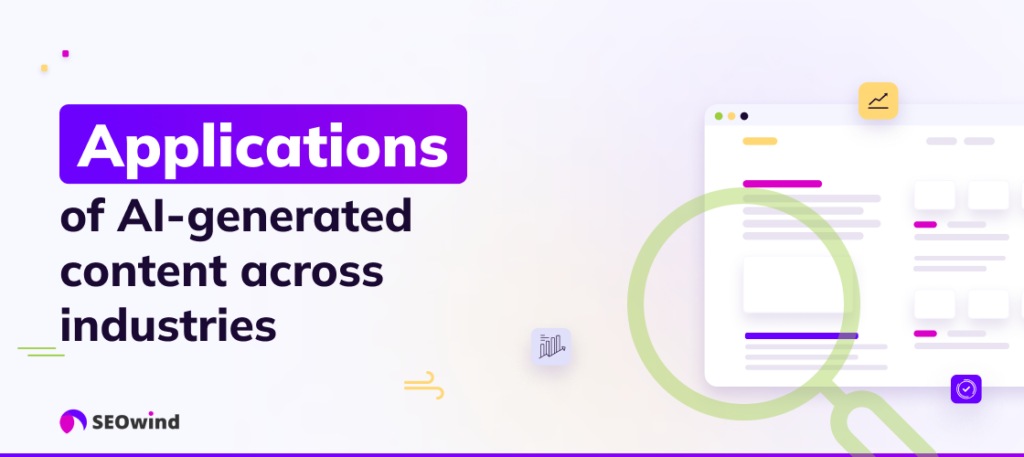
In quite an impressive manner, Artificial Intelligence is democratizing content creation and making waves in various industries. Its contribution is immense, as AI has found ways to generate high-quality, engaging content that can drastically improve your communication processes.
Marketing and advertising strategies powered by AI-generated content
Today, creatives are using AI-powered tools to create more adaptive advertising strategies. Instead of generating one kind of ad, machine learning algorithms are used to develop countless variations of a particular campaign based on specific user profiles.
This approach allows hyper-personalization as ads can be tailored to users’ browsing history, preferences, or recent purchases. This results in content relevant to each viewer with dynamically changing elements such as images, headlines, and call-to-action phrases. This ability constitutes one of the major trends in online advertising, aptly known as programmatic creative or dynamic creative optimization (DCO).
So, businesses have gained immensely from these evolutionary changes procured through AI-created content in their marketing stratagem.
E-commerce platforms utilize AI-generated product descriptions and reviews
AI-created content is no stranger to e-commerce either. It also powers vast segments of this industry, from product descriptions to automated chats. Consider how many e-commerce sites struggle with having numerous items but lack unique descriptions for each product. That’s where AI comes into play.
By applying natural language generation (NLG), businesses can quickly produce detailed item specifications or rich product descriptions that can impress any potential buyer while optimizing SEO performance.
Also noteworthy are artificially produced reviews that offer insights into consumer experiences based on large volumes of data gathered across the internet. This tactic is beneficial for prospective buyers and platforms looking for constructive feedback.
Journalism and news reporting with automated article writing
Artificial Intelligence in content creation has also staked its claim on journalism. An increasing number of media organizations rely on AI algorithms to quickly create data-heavy reports or even breaking news articles, drastically reducing the time spent between an event occurring and publishing a report about it.
However, AI-generated articles should be seen as complementing rather than replacing humans. Journalists still play a crucial role in shaping stories that require elaborate context, critical thinking, and nuanced interpretation.
Creative writing, storytelling, and screenplay generation through AI algorithms
You might think there’s no place for AI-generated content in creative ventures like storytelling or screenwriting. But we are witnessing mind-boggling advancements here, too!
OpenAI’s GPT-4 model has demonstrated incredible proficiency at producing coherent and authentic-sounding textual output when given a prompt. Whether crafting short stories inspired by specific themes or generating ideas for movie scripts based on character descriptions, the potential is immense.
Yet again, caution should be exercised here. While machines can pattern-match text impressively well, they lack the human touch needed for deep emotional resonance, at least for now!
So there you have the unfolding narrative of what AI-generated content is, demonstrating transformational impact across industries! As captivating as all this may sound today, we might just be sitting on the brink of unimaginable prospects tomorrow!
Ethical Considerations in Using AI-Generated Content
Navigating the world of Artificial Intelligence (AI) is thrilling, but it also poses ethical conundrums that one must grapple with. Let’s consider the challenge of protecting intellectual property rights and balancing automation with human craftsmanship in creating content.
Protecting Intellectual Property Rights When Using AI-Assisted Tools
We are witnessing how Artificial Intelligence generates fascinating content, from stunning artwork to compelling prose. However, who legally owns the results? The traditional notion concerning creative works assigns copyright to the creator. But when AI-generated content takes center stage, ascribing ownership becomes more complex.
One could argue that the software programmer should own the copyright because, without their algorithm, there is no content. Conversely, others could say that those running the program should possess legal rights since they initiated the process and provided data input.
The absence of explicit legislation addressing this phenomenon leaves the topic open for debate and interpretation. Until such time as this becomes clear, I recommend following these guidelines:
- Always give credit: Acknowledge the use of AI as a tool in generating any part of your content.
- Understand your Software License Agreement: Ensure it clarifies where authority lies over output created by using that software.
- Be proactive: In cases where you’re incorporating AI-generated elements within your work extensively, consider seeking legal advice to protect yourself from potential infringement risks.
Balancing Automation With Human Creativity and Craftsmanship in Content Creation
Artificial Intelligence certainly brings efficiency to content generation. It’s swift and tireless compared to human limitations. Nonetheless, there’s also inherent value in pieces developed organically by raw human creativity, such as spontaneous ideas sparked while sipping coffee or conversing at a park bench.
These experiences infuse our creations with unfiltered emotion and relatability that machines can’t replicate despite impressive advancements in developing AI-generated content. Therefore, rather than viewing it as an either-or situation, perceiving AI as a tool enhancing and diversifying human creativity is more advantageous.
In pursuing this harmony:
- Leverage the strengths of both: Use AI for content ideation or draft creation, but don’t neglect to apply your personal touch in refining the language, tone, and cultural relatability.
- Keep learning and developing your craft: Even while utilizing Artificial Intelligence in content creation, consistently hone your skills. Stay curious about new styles or trends in your field.
- Regularly Review Content: Ensure all AI-generated content maintains quality control standards. Machines may misunderstand context or miss emotional subtleties.
By mindfully navigating through these considerations, we can blend the best of both, drawing from the power of automation and maintaining the richness inherent in human creativity to create splendid pieces of work.
The Future of AI-Generated Content
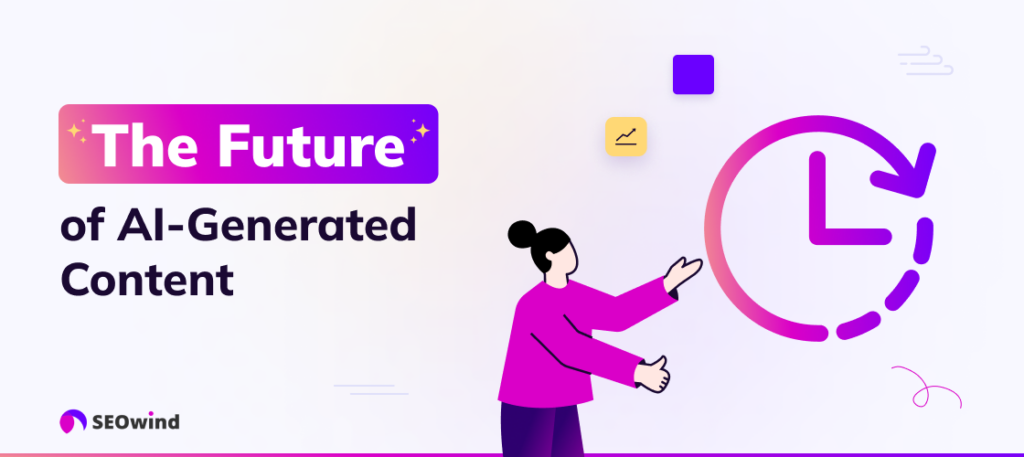
As we look towards the future, it’s clear that Artificial Intelligence is reshaping our world in numerous ways. One field where this impact is particularly palpable is content creation. It’s hardly surprising that the forecast for AI-generated content appears exceedingly bright and full of promise.
Trends Shaping the Future Development of AI-Powered Content Generation
Many significant trends wield substantial influence over the progressive development being mapped out for AI-generated content.
- Incorporation within creative industries: Increasingly, publishing and advertising organizations will embrace AI tools to streamline their workflows by creating early drafts or concepts.
- Integrating human-AI collaboration: Instead of replacing human input with machines, there’s a noticeable shift towards harmonizing both elements and valuing the unique strengths they bring to the table.
- Growth in customized content: Leveraging AI-enhanced personalization capabilities, businesses can focus more on delivering individually tailored messages, exponentially increasing customer engagement.
- Continuous learning models: As machine learning algorithms become more advanced, their capacity to predict and comprehend user preferences will improve their precision in generating relevant content.
These emerging trends hint at a future brimming with possibilities. However, let us also delve into potential societal implications, specifically concerning employment dynamics in creative industries.
Possible Social Implications and Impact on Employment in Creative Industries
Any technological evolution usually follows a ripple effect throughout society. Never has this been truer than with the rise of Artificial Intelligence-generated content.
Naturally, concerns arise about potential job losses as automated systems increasingly manage tasks previously done by humans. Yet perspectives abound postulating that rather than supplanting jobs wholesale, advancements in AI might predominantly reshape these occupations instead.
For instance, editors and marketing strategists may require more technical acumen or proficiency with AI tools. Jobs solely focused on mastering and managing these new technologies could also develop into an entire career niche that didn’t exist previously. Innovation invariably spawns opportunities.
Moreover, the ability of Artificial Intelligence to tackle tedious chores frees humans to lean into undertakings that require intuition, emotional insight, or inherently human creativity.
The prospect of AI-generated content introduces intriguing notions, igniting fascinating dialogues at the confluence of ethics, technology, society, and creativity’s essence. As we progress into this intriguing future, it’s integral that we remain receptive and adaptable to anticipate alterations as promising breakthroughs rather than ominous threats.
